This article has multiple issues. Please help improve it or discuss these issues on the talk page . (Learn how and when to remove these template messages) |

Terry St Clair is a British folk musician, guitarist and composer.
This article has multiple issues. Please help improve it or discuss these issues on the talk page . (Learn how and when to remove these template messages) |

Terry St Clair is a British folk musician, guitarist and composer.
St Clair was born in Burslem, Staffordshire, England. As a child, he demonstrated his desire to become a musician. He would try to play anything that could produce a tune.
St Clair and his family moved to Hinckley, Leicestershire in 1953. [1] His parents encouraged his love of music, arranging for piano lessons at the age of nine. He also practised his singing skills as a member of the local church choir, where he also played the church organ.
It was at a school concert that he heard older pupil Geoffrey Richardson (later joining progressive rock group Caravan) performing the folk blues of Bert Jansch and Jackson C. Frank, inspiring St. Clair to take up the guitar. His first guitar was home-made, and hardly stayed in tune.
Whilst working at the local printers W. Pickering and Sons. he and friends Pete Thomas and Mervin Wallace took over the running of the Bar W Folk Club in Barwell.
After he left school, worked as an apprentice book-binder, enrolling at the Matthew Bolton College in Birmingham. During this five-year period he spent most of his time playing guitar and singing in local folk clubs. St Clair started to write songs during this period. The first being "You Don't Need Me", written for a friend who used heroin and died in 1993. "You Don't Need Me" was not recorded until 1994, on Basically.
In 1968 St Clair met Toni Savage. Savage was a local folk club organiser and agent. He ran a private press from his workshop in Leicester, where he printed and published material for Spike Milligan among others. Savage supported St Clair's career, and booked him into folk clubs and concerts around the country. St Clair's television debut was on ITV's New Faces on his birthday in 1974, singing one of his own songs, "So Many Empty Mornings'". That same year he headed south for London and a professional life as a singer-songwriter, playing in wine bars and restaurants.
In 1977 St Clair moved back to the Midlands, got married, and had a daughter Anna (born 1978). He also took a job as a sales representative with a record distributor. During this period he formed a folk-rock band called Millstone Bill with old friend Steve Southorn; they played pub and club venues around the Midlands. St Clair was still writing songs and the band performed most of the material.
St Clair's marriage broke up in 1980, and he moved back to London, first working as a driving instructor where in 1981 he met his wife and St Clair now says he has two daughters.
Between 1982 and 1984 St Clair travelled extensively around Europe. Initially by hitch-hiking to France, Italy and Greece. St Clair set up home in North London; by this time being booked to play in Italy, the Netherlands and the Republic of Ireland as well as all over the UK.
Street Theatre became popular and St Clair enjoyed this freedom to perform in towns and cities throughout Europe. It was during this period that he performed alongside comedians such as Eddie Izzard, Sarah Crow and Ann Bryson (then known as the Flaming Hamsters). Not between Two and Five St Clair's first album came out in 1985. Financed by businessman Nelson King; recorded and produced by Bob Lamb at his studio at Kings Heath, Birmingham, it has now sold well in excess of 60,000 copies. Keyboards and arrangement were by Phil Johnstone.
St Clair continued to write songs and perform throughout the 1980s, gaining bigger audiences. He played at a Barry Manilow concert at Blenheim Palace, and in 1988 St Clair performed to 5,000 people at the Festival of Voices in the Wembley Conference Centre.
His second album, From the Little Back Room was released in 1991, having taken eighteen months to record. The production and arrangements using electronic sequencing and samples were all completed by St Clair. In 1994 St Clair recorded Basically... Terry St. Clair, his first completely acoustic album. In 1997 St Clair was approached by an American record label, to record a new album in New York City, although the deal ultimately fell through. At this time st Clair performed in the United States for the first time. St Clair was introduced to music journalist John Tobler by Dave Cousins of the Strawbs.
St Clair's next release, Black White was recorded and released on his own label, having been recorded at the Denton Studios in Chiswick.
St Clair's composition "Different World" was used in the soundtrack to the film Iffy; whilst "If I Fall in Love with You" was in the Mike Binder film, The Upside of Anger (2005), starring Kevin Costner. [2] In January 2011 Terry released his fifth album titled Hard Times and other Riddles. It is a collection of contemporary and traditional folk song.
Terry continues to write music and performs throughout the United Kingdom and Europe.
In November 2018 Terry St.Clair was nominated as an elected trustee and director of the Covent Garden Area Trust.
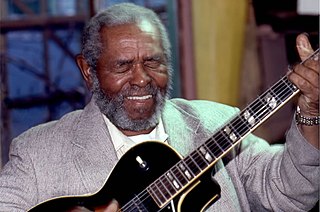
Walter Brown "Brownie" McGhee was an American folk and Piedmont blues singer and guitarist, best known for his collaboration with the harmonica player Sonny Terry.

Huddie William Ledbetter, better known by the stage name Lead Belly, was an American folk and blues singer notable for his strong vocals, virtuosity on the twelve-string guitar, and the folk standards he introduced, including his renditions of "In the Pines", "Goodnight, Irene", "Midnight Special", "Cotton Fields", and "Boll Weevil".

Steven Benjamin Goodman was an American folk and country singer-songwriter from Chicago. He wrote the song "City of New Orleans", which was recorded by Arlo Guthrie and many others including John Denver, The Highwaymen, and Judy Collins; in 1985, it afforded Goodman the Grammy songwriter award for best country song, as performed by Willie Nelson. Goodman had a small but dedicated group of fans for his albums and concerts during his lifetime. His most frequently sung song, "Go Cubs Go", is about the Chicago Cubs. Goodman died of leukemia in September 1984.
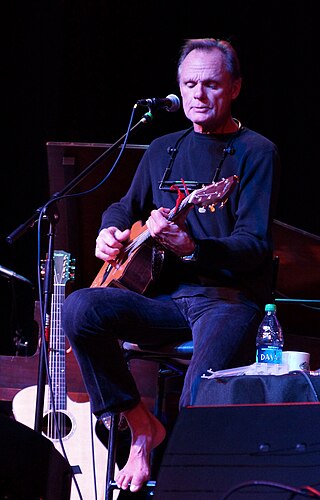
Jonathan Edwards is an American country and folk singer-songwriter best known for his 1971 hit single "Sunshine".

Steeleye Span are a British folk rock band formed in 1969 in England by Fairport Convention bass player Ashley Hutchings and established London folk club duo Tim Hart and Maddy Prior. The band were part of the 1970s British folk revival, and were commercially successful in that period, with four Top 40 albums and two hit singles: "Gaudete" and "All Around My Hat".
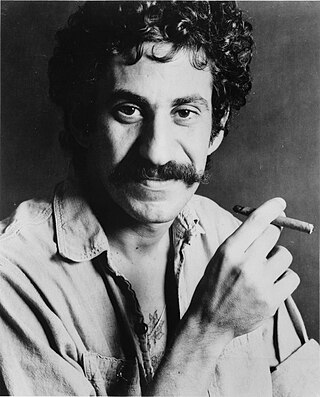
James Joseph Croce was an American folk and rock singer-songwriter. Between 1966 and 1973, he released five studio albums and numerous singles. During this period, Croce took a series of odd jobs to pay bills while he continued to write, record, and perform concerts. After Croce formed a partnership with songwriter and guitarist Maury Muehleisen in the early 1970s, his fortunes turned. Croce's breakthrough came in 1972, his third album, You Don't Mess Around with Jim, produced three charting singles, including "Time in a Bottle", which reached No. 1 after Croce died. The follow-up album, Life and Times, included the song "Bad, Bad Leroy Brown", which was the only No. 1 hit he had during his lifetime.
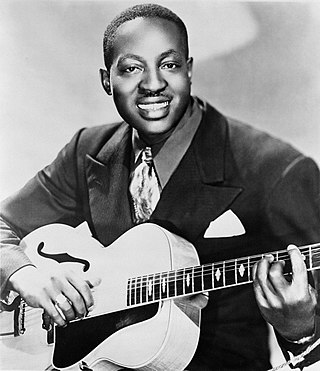
Big Bill Broonzy was an American blues singer, songwriter, and guitarist. His career began in the 1920s, when he played country music to mostly African-American audiences. In the 1930s and 1940s, he navigated a change in style to a more urban blues sound popular with working-class black audiences. In the 1950s, a return to his traditional folk-blues roots made him one of the leading figures of the emerging American folk music revival and an international star. His long and varied career marks him as one of the key figures in the development of blues music in the 20th century.

Herbert Jansch was a Scottish folk musician and founding member of the band Pentangle. He was born in Glasgow and came to prominence in London in the 1960s as an acoustic guitarist and singer-songwriter. He recorded more than 28 albums and toured extensively from the 1960s to the 21st century.

John Renbourn was an English guitarist and songwriter. He was best known for his collaboration with guitarist Bert Jansch as well as his work with the folk group Pentangle, although he maintained a solo career before, during and after that band's existence (1967–1973). He worked later in a duo with Stefan Grossman.

Richard Peter Gaughan is a Scottish musician, singer and songwriter, particularly of folk and social protest songs. He is regarded as one of Scotland's leading singer-songwriters.

Merle Robert Travis was an American country and western singer, songwriter, and guitarist born in Rosewood, Kentucky, United States. His songs' lyrics often discussed both the lives and the economic exploitation of American coal miners. Among his many well-known songs and recordings are "Sixteen Tons", "Re-Enlistment Blues", "I am a Pilgrim" and "Dark as a Dungeon". However, it is his unique guitar style, still called "Travis picking" by guitarists, as well as his interpretations of the rich musical traditions of his native Muhlenberg County, Kentucky, for which he is best known today. Travis picking is a syncopated style of guitar fingerpicking rooted in ragtime music in which alternating chords and bass notes are plucked by the thumb while melodies are simultaneously plucked by the index finger. He was inducted into the Nashville Songwriters Hall of Fame in 1970 and elected to the Country Music Hall of Fame in 1977.
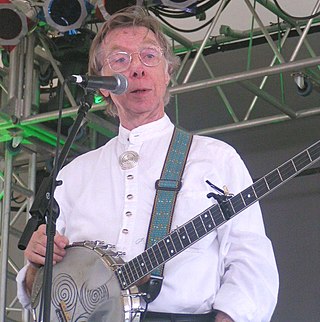
Thomas Makem was an Irish folk musician, artist, poet and storyteller. He was best known as a member of the Clancy Brothers and Tommy Makem. He played the long-necked 5-string banjo, tin whistle, low whistle, guitar, bodhrán and bagpipes, and sang in a distinctive baritone. He was sometimes known as "The Bard of Armagh" and "The Godfather of Irish Music".
Sunjay Edward Brain is a British singer-songwriter and guitarist from Stourbridge in the West Midlands of England.
Isla St Clair is a Scottish singer.
Amazing Blondel are an English acoustic progressive folk band, containing Eddie Baird, John Gladwin, and Terry Wincott. They released a number of LPs for Island Records in the early 1970s. They are sometimes categorised as psychedelic folk or as medieval folk rock, but their music was much more a reinvention of Renaissance music, based around the use of period instruments such as lutes and recorders.
The Modern Folk Quartet was an American folk music revival group that formed in the early 1960s. Originally emphasizing acoustic instruments and group harmonies, they performed extensively and recorded two albums. In 1965, as the Modern Folk Quintet, they ventured into electric folk rock and recorded with producers Phil Spector and Jack Nitzsche. Although MFQ received a fair amount of exposure, their rock-oriented recordings failed to capture their sound or generate enough interest and they disbanded in 1966. Subsequently, MFQ re-formed several times and made further recordings.

Roy Book Binder is an American blues guitarist, singer-songwriter and storyteller. A student and friend of the Rev. Gary Davis, he is equally at home with blues and ragtime. He is known to shift from open tunings to slide arrangements to original compositions, with both traditional and self-styled licks. His storytelling is another characteristic that makes his style unique.
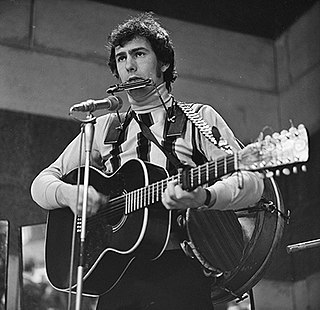
Donald Eric Partridge was an English singer and songwriter, known as the "king of the buskers". He performed from the early 1960s first as a folk singer and later as a busker and one-man band, and achieved unexpected commercial success in the UK and Europe in the late 1960s with the songs "Rosie", "Blue Eyes" and "Breakfast on Pluto". He later was a founder of the group Accolade, which released two albums. He continued writing music, playing, busking and recording, mainly as a solo artist, until 2008.
Chris Flegg is a singer, guitarist and songwriter based in St Albans, UK, who has produced a number of albums, some of which feature songs in a contemporary folk style and some which have instrumental jazz tracks, with albums of both styles getting radio play, mainly on local UK radio stations.

Steve Frank Ashley is an English singer-songwriter, recording artist, multi-instrumentalist, writer and graphic designer. Ashley is best known as a songwriter and first gained public recognition for his work with his debut solo album, Stroll On. Taking his inspiration from English traditional songs, Ashley has developed a songwriting style which is contemporary in content while reflecting traditional influences in his melodies, poetry and vocal delivery.